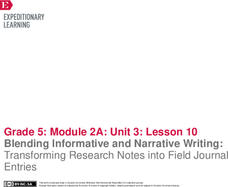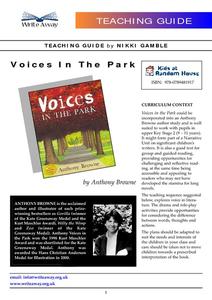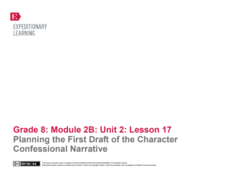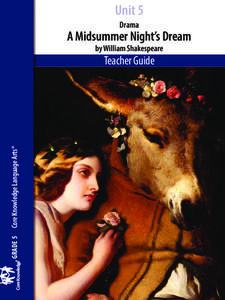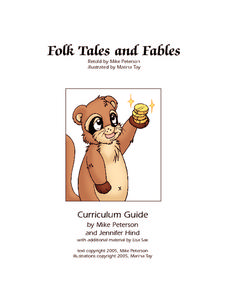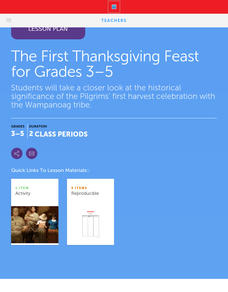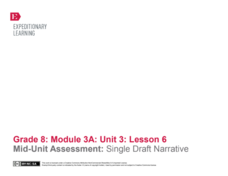Trinity University
Explain Yourself: An Expository Writing Unit for High School
Introduce expository writing with a unit that asks writers to craft an essay to explain a belief, value, or priority that is important to them. Mini-lessons within the unit focus on crafting thesis statements and conclusions, selecting...
EngageNY
Our Group Readers Theater: Revision, Conclusion, and First Rehearsal
Revision is the key to great writing. Individuals revise their readers theater scripts and write a group conclusion. Scholars then perform their scripts for another group and receive feedback.
EngageNY
Blending Informative and Narrative Writing: Transforming Research Notes into Field Journal Entries
The fabulous four. Scholars learn the four key components for creating an excellent journal entry. They then work to create a journal entry rubric and participate in a mini lesson about organizing and outlining journal entries.
Channel Islands Film
Lone Woman of San Nicolas Island: Lesson Plan 2
After watching West of the West's documentary The Lone Woman of San Nicolas Island, class members imagine how Juana Maria/Karana may have felt about living alone on the island for 18 years and craft a blackout poem or a narrative in her...
Write Away!
Voices In the Park
Explore the impact a narrator's point of view has on a story with a reading of the children's book, Voices in the Park by Anthony Browne. Written in four different voices, the story is told and retold from different perspectives to...
EngageNY
Planning the First Draft of the Character Confessional Narrative
Scholars read and analyze a model character confessional narrative to help guide their writing. Then, they plan the first draft of a character confessional based on Shakespeare's A Midsummer Night's Dream.
EngageNY
Mid-Unit 2 Assessment: Analyzing Narrative Structure and Author’s Craft: Part 1
Using the resource, scholars complete a mid-unit assessment to gauge their learning at the halfway point of the unit. Pupils read the myth "The Harvest That Never Came" and plot its narrative structure.
Curated OER
Making Magical Creatures Talk
Invite your young writers to take the reins with writing dialogue. Using two characters of their own creation, kids work with partners and then individually to write short conversations.
Curated OER
How to Write a Mystery
Was it the teacher with the ruler in the supply closet? Find out when you read mystery stories inspired by this presentation. Show the slide show to your pupils to give them ideas that will help them get started with writing their own...
EngageNY
Planning Ideas: Developing a Colonial Character Profile
The second lesson in a historical fiction series encourages pupils to develop a character profile of a colonial person using research acquired in the previous unit. Learners prepare their historical fiction narrative by responding to a...
Orange County Department of Education
Poppa's New Pants
Angela Shelf Medearis' Poppa's New Pants provides third graders with an opportunity to stitch together their own narrative filled with sensory details. After reading the story and noting the sensory and concrete details in the tale that...
Core Knowledge Foundation
Unit 5: A Midsummer Night’s Dream
Fifth graders analyze William Shakespeare's A Midsummer Night's Dream, paying close attention to character development, plot, and dialogue. With daily reading and thoughtful discussion, scholars take pen to paper to respond to journal...
Core Knowledge Foundation
The Human Body—Systems and Senses Tell It Again!™ Read-Aloud Anthology
Nine lessons over three weeks explore the human body through read-alouds. Third graders listen to and discuss a reading followed by extension activities, including word work and comprehension practice. Learners draft a narrative essay.
Weekly Story Book
Folk Tales and Fables
Pages and pages of engaging activities, worksheets, and writing projects on teaching folktales and fables await you! You don't want to miss this incredible resource that not only includes a wide range of topics and graphic organizers,...
EngageNY
Preparing to Write Historical Fiction: Determining Characteristics of the Genre
A language arts instructional activity helps young writers identify elements that make up historical fiction. First, it guides them through elements of fictional pieces with vocabulary cards. Then, pupils work collaboratively to...
Houghton Mifflin Harcourt
Elaboration, Revision, and Proofreading
Designed to help writers strengthen their elaboration, revision, and proofreading skills, this 48-page workbook is packed with information about and exercises in personal, narrative, persuasive, and report writing.
EngageNY
Storyboard Revision: Managing the Sequence of Events and Using Sensory Details
Mastering techniques from the resource, pupils give life to their writing, revising their storyboards to include sensory details and transitions. To finish, they participate in a peer critique process and use the feedback to further...
National Endowment for the Humanities
“Twelve Years a Slave”: Analyzing Slave Narratives
Readers of Solomon Northup's brutally frank slave narrative Twelve Years a Slave examine passages that support the argument that slavery "undermined and corrupted" the institution of marriage. Background information is provided by a...
Classical Academies
Story Openings
How should you begin a story? Show this presentation to give your class a few ideas. Each slide includes information about story openings and examples of certain types of story openings written by well-known authors. After showing the...
Ford's Theatre
How Perspective Shapes Understanding of History
The Boston Massacre may be an iconic event in American history, but perhaps the British soldiers had another point of view. Using primary sources, including reports from Boston newspapers and secondary sources from the British...
Scholastic
The First Thanksgiving Feast for Grades 3-5
Scholars examine the first Thanksgiving through books and interviews while they complete a KWL chart. Pretending they are part of the feast, learners craft a scrapbook page that features images related to their experience. Pupils reflect...
EngageNY
Mid-Unit Assessment: Single Draft Narrative
Put it in your own words. Scholars work independently on their mid-unit assessments by responding to a writing prompt. They write about Miné Okubo’s life and the moments when Okubo became visible again.
Simon & Schuster
Classroom Activities for Narrative of the Life of Frederick Douglass, an American Slave
The Narrative of the Life of Frederick Douglass is the focus of three activities designed for readers of the autobiography. First, class members deconstruct the title to understand Douglass's purpose in writing. Next, scholars examine...
EngageNY
Why Did Douglass Write the Narrative?
Readers take another look at Narrative of the Life of Frederick
Douglass to determine the purpose of the text. They use Frederick Douglass’s Purpose: Text and Questions handout and a close reading guide to direct their thinking. To...
Other popular searches
- Narrative Writing Prompts
- Narrative Writing Ideas
- Narrative Writing Grade 3
- Narrative Writing Worksheets
- Cinderella Narrative Writing
- Teaching Narrative Writing
- 3rd Grade Narrative Writing
- Fictional Narrative Writing
- Narrative Writing Organizers
- 1st Person Narrative Writing
- Interview Narrative Writing
- Writing a Narrative




